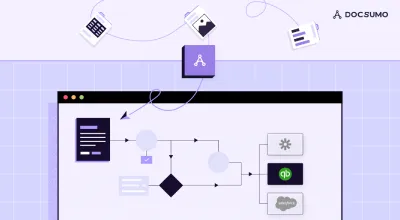Retail automation helps business owners develop better customer loyalty programs, predict upcoming market trends, and facilitate data merge across different channels. Below we'll give a breakdown of its use cases and show how retail automation can benefit your business.
The retail industry is projected to automate 80% of its manual labor-intensive processes post-2021 with retailers adopting automation workflows with businesses. Understanding customer demands and keeping up with market trends are going to be the leading factors behind the technology’s adoption. AI will be used for making smart business decisions and business owners will focus on strategic investments based on insights derived from these technologies.
Retail automation use-cases
Automation is already leading to reduced waiting queues, fewer delays, seamless checkouts, and higher rates of customer satisfaction. Here are its different applications:
1. Document processing
Manually processing customer documents, invoices, shipping receipts, and other documents for your business can consume hours of precious time. You can digitize document processing and atutomatically handle data extraction and processing. Docsumo can help you convert physical documents into electronic data, save, and back up for later use. Electronic documents are also more searchable and easier to organize than paper-based file storage.
2. Security
Retail store authorities can improve data security, integrity, and privacy by leveraging automation features. For example, if you are trying to prevent document fraud or meet regulatory compliance, operating automated retail stores will be especially useful. This is because intelligent document processing models verify, validate, and check entered data automatically for anomalies or any sort of discrepancies. If any errors are spotted, they get flagged and sent to users for a manual review or in worse cases, rejected and sent back to the concerned individuals.
3. Customer onboarding
New customers are constantly signing up on ecommerce stores or window shopping online. You can use retail automation solutions to engage with them and target prospective leads based on previous site visits. For example, automatically sending a welcome email with a discount code included with it. Email marketing becomes easy since you have piles of customer data you can analyze and draw insights from using automation tools. You can run A/B split campaigns and see how they fare against each other as well.
4. Inventory management
An automated inventory management system uses a variety of tools to speed up purchase order processing, inventory restocking, and streamline order fulfillments. Multi-channel inventory management using automation lets business owners track inventory across different warehouses, automate product delivery, and sync inventory and order data from multiple sales channels. In short, it makes a business more efficient which enhances the whole customer experience. Automated inventory management tools are capable of generating electronic invoices,
5. Payroll
Payroll processing involves automation cumbersome data management and processing tasks for the HR department. Retail automation workflows can track employee attendance, automate customer support, and disburse refunds instantly using built-in features and integrations. Businesses become cost-efficient and get an overview of their financials as well in the process.
6. Customer reviews
The best time to invite customers to leave a review of your business is right after they’ve interacted and bought products from the store. You can reach out to customers after they’ve processed payments and check with them post-purchase. Automated customer review collection and requests are an effective way to build brand loyalty, boost client retention, and improve total sales. You also make your business more responsive since you’re able to monitor, track, and share these reviews in other channels. Analytics tools in retail automation help uncover customer sentiments and find out what they’re really thinking about your products/services, thus bringing you better business insights.
Final Words
Retail automation can help businesses adjust prices for different products and visualize future outcomes by analyzing historical data trends to help figure out trending products. Systems collect information about sales figures, promotional campaigns, and use intelligent automation with AI to forecast pricing and market trends. It is possible to add product categorizations automatically by using Machine Learning in the industry and automated retail management platforms can process more than thousands of requests in a given day. Brands can make personalized product recommendations to customers by simply analyzing the data derived from past sales.

%2520Main%2520Image-min.webp)
.webp)

![What is Intelligent Document Processing (IDP) Software? [Comprehensive Guide]](https://cdn.prod.website-files.com/64be86eaa29fa71f24b00685/658c12d4416cf5fac4c29322_What%20is%20Intelligent%20Document%20Processing%20(IDP)%20Software_%20Thumbnail.webp)

.webp)
.webp)
.webp)
.webp)